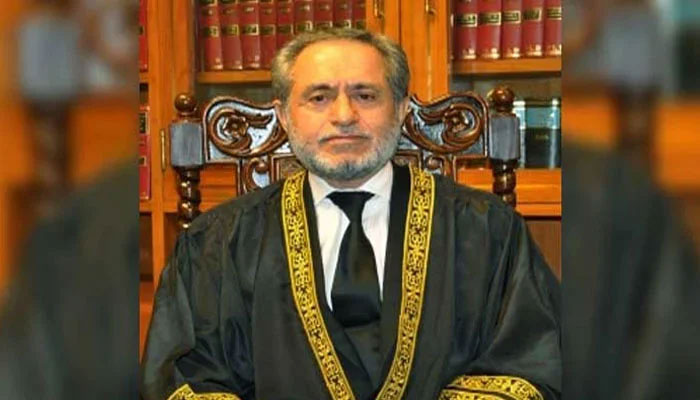Hindering military officer's work invokes ATA: Justice Mandokhail
Justice Mazhar says Army Act was specifically for members of Pakistan Armed Forces
ISLAMABAD: Supreme Court’s judge Jamal Khan Mandokhail Wednesday observed that obstructing the duties of a military officer falls under the Anti-Terrorism Act, and the events of May 9 also involved offenses under the Official Secrets Act.
The seven-member Constitutional Bench of the Supreme Court, headed by Justice Amin-ud-Din Khan, heard the case regarding the trial of civilians in military courts.
During the hearing, Justice Muhammad Ali Mazhar remarked that the Army Act is specifically for the members of Pakistan Armed Forces.
In response, the Ministry of Defence counsel, Khawaja Haris, stated the Constitution of Pakistan specifies that the Army Act is for the discipline and performance of duties by the armed forces. He added, “I would like to clarify that the events of May 9 did not involve any offense under the Anti-Terrorism Act.” Khawaja Haris argued that Article 8(3) ensures that the armed forces can perform their duties effectively.
Justice Mandokhail responded by saying that the F B Ali case raised questions about fundamental rights. Khawaja Haris replied that the F B Ali case was challenged on the grounds that our fundamental rights were being violated. Justice Amin-ud-Din questioned how Section 2(1)(d) could be declared unconstitutional even if the nexus is not established.
During the hearing, Justice Musarrat Hilali, engaging with Khawaja Haris, asked, “How long will it take for you to complete your arguments? I will not be available for the next two weeks.” The Constitutional Bench adjourned the hearing until today (Thursday).
-
 James Van Der Beek's Friends Helped Fund Ranch Purchase Before His Death At 48
James Van Der Beek's Friends Helped Fund Ranch Purchase Before His Death At 48 -
 King Charles ‘very Much’ Wants Andrew To Testify At US Congress
King Charles ‘very Much’ Wants Andrew To Testify At US Congress -
 Rosie O’Donnell Secretly Returned To US To Test Safety
Rosie O’Donnell Secretly Returned To US To Test Safety -
 Meghan Markle, Prince Harry Spotted On Date Night On Valentine’s Day
Meghan Markle, Prince Harry Spotted On Date Night On Valentine’s Day -
 King Charles Butler Spills Valentine’s Day Dinner Blunders
King Charles Butler Spills Valentine’s Day Dinner Blunders -
 Brooklyn Beckham Hits Back At Gordon Ramsay With Subtle Move Over Remark On His Personal Life
Brooklyn Beckham Hits Back At Gordon Ramsay With Subtle Move Over Remark On His Personal Life -
 Meghan Markle Showcases Princess Lilibet Face On Valentine’s Day
Meghan Markle Showcases Princess Lilibet Face On Valentine’s Day -
 Harry Styles Opens Up About Isolation After One Direction Split
Harry Styles Opens Up About Isolation After One Direction Split -
 Shamed Andrew Was ‘face To Face’ With Epstein Files, Mocked For Lying
Shamed Andrew Was ‘face To Face’ With Epstein Files, Mocked For Lying -
 Kanye West Projected To Explode Music Charts With 'Bully' After He Apologized Over Antisemitism
Kanye West Projected To Explode Music Charts With 'Bully' After He Apologized Over Antisemitism -
 Leighton Meester Reflects On How Valentine’s Day Feels Like Now
Leighton Meester Reflects On How Valentine’s Day Feels Like Now -
 Sarah Ferguson ‘won’t Let Go Without A Fight’ After Royal Exile
Sarah Ferguson ‘won’t Let Go Without A Fight’ After Royal Exile -
 Adam Sandler Makes Brutal Confession: 'I Do Not Love Comedy First'
Adam Sandler Makes Brutal Confession: 'I Do Not Love Comedy First' -
 'Harry Potter' Star Rupert Grint Shares Where He Stands Politically
'Harry Potter' Star Rupert Grint Shares Where He Stands Politically -
 Drama Outside Nancy Guthrie's Home Unfolds Described As 'circus'
Drama Outside Nancy Guthrie's Home Unfolds Described As 'circus' -
 Marco Rubio Sends Message Of Unity To Europe
Marco Rubio Sends Message Of Unity To Europe




